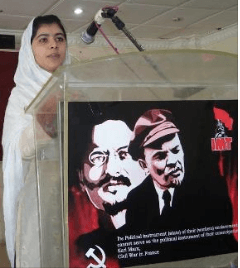Pakistanis outraged after Taliban try to assassinate outspoken girl, 14
Malala Yousafzai has been an outspoken advocate for educating women in Pakistan. (Photo by Indus Asia Online Journal via Wikimedia Commons.)
Malala Yousafzai is 14-years-old.
She lives in Pakistan and is known throughout her home country for the work she’s done campaigning for girls’ education.
On Tuesday, she was shot in the neck by the Pakistani Taliban — and it’s ignited a firestorm of protests and controversy. A spokesman for the Taliban said the attack was in retaliation for her work to promote education for girls and women.
“Malala is our pride. She became an icon for the country,” Interior Minister Rehman Malik said, according to The New York Times.
Malik vowed to catch the shooters, going so far as to offer a $100,000 reward for information leading to them.
Surgeons removed a bullet from Malala shoulder and said she was out of immediate danger, though remained unconscious, on a ventilator and too weak to travel even to the United Arab Emirates for emergency treatment. All the same, government officials commandeered a Pakistani airliner and had it on standby at a nearby airport should an airlift be urgently needed.
The Taliban has vowed to attack Malala again if given the chance, a claim that has further incensed the Pakistani public.
Malala first came to the world’s attention after writing a diary for the BBC in 2009 and then appearing regularly to talk about how Taliban militants had taken control of where she lives in the Swat Valley.
The Taliban were ejected from the Swat Valley in 2009, but her family has said they’ve received death threats since. Her family, however, felt she’d be safe in her community.
Malala was attacked on her way home from school in Mingora, the region’s main town. The shooting has left many shocked and concerned for the safety of others who fight for women’s rights.
“Schools in the Swat Valley closed on Wednesday in protest at the attack, and schoolchildren in other parts of the country prayed for the girl’s recovery,” the BBC reported.
